
If you’re very active on Facebook and use the platform for your business, or to manage a large and engaged group, chances are you have ended up in Facebook jail at some point.
Facebook jail is a colloquial term used to refer to the platform’s policing efforts and restrictions put in place to reprimand its users for bad behavior, be it because of abuse or because they violate Facebook’s rules. It is sadly an all too common issue among expert Facebook Admins, a proven by a discussion in our private Facebook Group for Community Experts.
In this article, we will look at what Facebook jail is, what kinds of behaviours can land you there, what to do if you are sent to jail and how to avoid ending up there. And if you are unlucky enough to find yourself in jail, we will look at things you can do to get out faster.
What is Facebook’s jail
Facebook jail is the casual and informal way to refer to the temporary restriction imposed by Facebook on users or pages who are deemed to abuse the platform or who have violated the Community Standards or the Terms of Service.
It is not an official term used by Facebook but one coined by users, especially by Facebook Group Admins who find themselves there as a result of the natural day to day of their work, and it is a measure put in place by Facebook to remove spam, abuse and to reduce rule violations.
Fun fact: Even Facebook employees end up in Facebook jail, even those whose job entails managing Facebook Power Admin Communities. At least the rules apply to everyone equally.
A Facebook jail card should essentially be thought of as a time-out, a way for the social network to get users to cool down and stop the behavior that got them in jail in the first place so they don’t continue causing issues by spamming or offending other users. It may also be a great excuse to take a break from the platform.
In order to better understand Facebook’s jail, you could think about it as any legal system of punishment and probation.
You commit a crime and may first just get a warning or a fine. If you continue, you may end up in jail for a specific length depending on the severity of the crime. You could be released on probation, but if you commit another crime during that probation, your punishment will be tougher and you may end up in jail for longer. If you commit a serious crime, you could be locked away in jail for life.
Facebook’s jail works the same way hence why this is such a good metaphor to refer to Facebook’s ban, restriction and suspension policies.
Why Facebook jail is necessary
If you are an active user of the platform, no doubt you will have found yourself in jail one time or another. While it is frustrating, the measure is there to protect its users, all of us, and if it worked as intended, it would be a fantastic way to keep it a safe space for everyone.
From Facebook’s Terms of Service:
“We want Facebook to be a place where people feel welcome and safe to express themselves and share their thoughts and ideas. If we determine that you have clearly, seriously or repeatedly breached our Terms or Policies, including in particular our Community Standards, we may suspend or permanently disable access to your account. We may also suspend or disable your account if you repeatedly infringe other people’s intellectual property rights or where we are required to do so for legal reasons.”
At the core, the concept of a Facebook jail and all the other measures the platform has developed since the Cambridge Analytica scandal, were implemented to deter platform abuse. That is, to avoid the propagation of misinformation, to promote only authentic behavior that respects all users and to create a safe environment free of hate speech where users are able to interact with dignity and respect.
However, Facebook has been under increased scrutiny with regards to what it considers abuse, where the line of freedom of expression lies and how to tackle this in a way that is financially sustainable, scalable and automated.
The implications of Facebook jail for your business
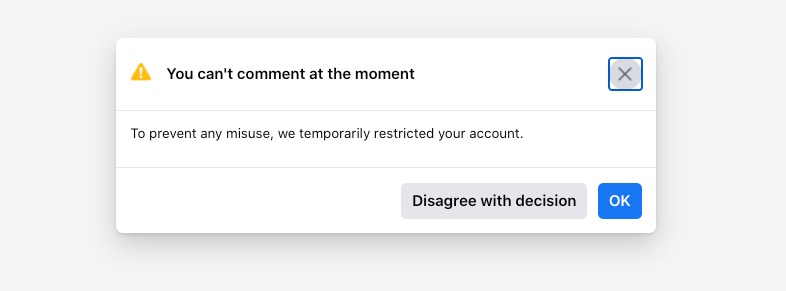
Facebook jail, and other measures that the platform takes to prevent misuse, were implemented with the best intentions but can have a very negative impact on businesses.
Unlike the legal system in most countries, Facebook’s “laws” are not clear, aren’t always written down, and can change everyday without dialogue and without proper communication. This means users need to be constantly checking the latest updates to ensure compliance.
Additionally, the punishment depends not only on the offence committed but also on the history or “record” of the user, although he or she has no access to it. You don’t even know how long your time in jail is for or what the offence committed was, and generally have no right of appeal or compensation if you were wrongly committed.
If that wasn’t bad enough, the automated AI bots that determine what content should be removed are often wrong and still have a long way to go to achieve 100% accuracy, which means that the innocent can also end up in jail.
Put this all together and you have users who end up in Facebook jail without realizing they were doing something wrong (or even without actually doing anything wrong) and who don’t know how long they will be there for. In most cases, users will only see the pop-up alert shown above which has no details on the infraction or the duration of the restriction.
Because of the lack of accuracy, the uncertain and changing list of offences and the lack of recourse, Facebook jail can have a very negative impact on your business.
For example, if the main administrator of an advertising account or business page is suspended from the platform while they have an ad running that they need to modify or stop or if you just launched a new product and your business page is suddenly banned from interacting with users, account suspension or ban can have ramifications beyond not being able to like your friend’s posts.
Pro tip: We strongly recommend that you have additional backup administrators for your pages and businesses and that you always do business assuming that your account could end up in jail at anytime, ie having thought about alternatives should that happen.
Facebook jail vs. Muting
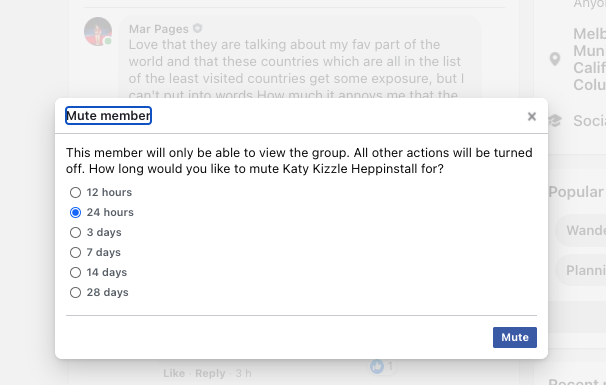
It’s important to differentiate the ban imposed by the platform itself, which is referred to as Facebook jail, and the commenting ban imposed by an admin of a group.
Admins have the option to “mute” another member if they deem they have broken the group rules and want to give them a time out, and they can do so for as long as 7 days. Users are notified of this and the ban is automatically lifted by the platform.
Muting a member does not prevent them from any other behavior than from posting or commenting in the group that has muted them, whereas when a user ends up in Facebook jail that ban affects their full use of the platform.
We don’t believe that muting a member makes them more likely to end up in Facebook jail, though as with everything Facebook related, there is no written statement that proves or disproves our hypothesis.
What happens when you end up in Facebook jail
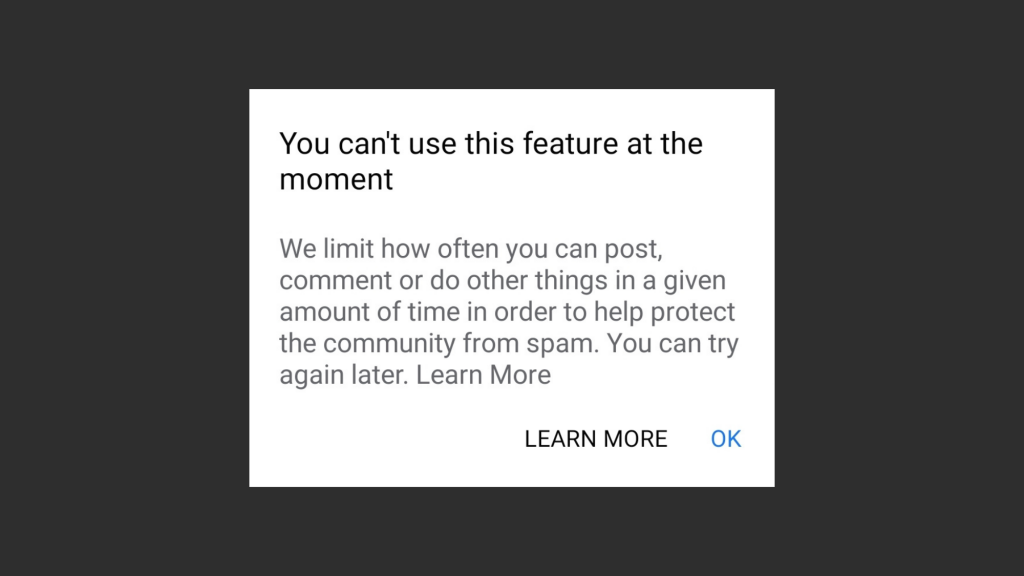
Firstly, Facebook will notify you of your offence and the channel for that depends on what you did.
If you are banned from certain actions, the first thing you will notice is a pop up notification telling you your behavior is abusive and that you have been banned from doing that, be it tagging, commenting, reacting, etc. Interestingly, you don’t usually get told what it is that you did but instead receive a generic “To prevent any misuse, we temporarily restricted your account”, so you will have to try to see what you can and cannot do.
If your jail card is because you violated the Community Standards, you will get a notification alert telling you more about your infringement and a notice in your profile under Help & Support -> Support Inbox. These historical violations will remain there even after resolved.
Pro tip: You can also turn on notifications for Community Standard violations from your profile going to Help & Support -> Support Inbox.
Secondly, you will be placed in jail and the ban will come into place. The implications of being in Facebook jail vary depending on the type of behavior and the ban imposed.
Users can be banned from using a feature (eg. not being able to tag members) or can be banned from any usage of the platform by having their account suspended or completely deleted. The type of offence committed and the history of the user on the platform seem to determine how long and strict the time in jail is.
The more you keep doing something considered abusive, the longer the time you’ll be placed in jail and the higher the chance of the ban becoming more widespread and affecting other functionalities. However, you can also go from being a respectable citizen to being fully banned for good or even removed from your group as an Admin.
Bottom line, after you are out from Facebook jail, tread even more carefully than before and make sure that you do not break any rules or do anything suspicious or that could be considered spammy or you will end up in jail again. Remember that during your probation, your thresholds for abusive behavior will be lower so you should spread out your actions even more.
Lastly, bear in mind that if your account is fully suspended, you will also be banned from accessing other features on Facebook, for example, you won’t be able to post to your pages as the admin or to Instagram, and even the content you had scheduled will fail to post.
What behaviors can land you in Facebook jail
In order to avoid ending up in Facebook jail, we need to understand what Facebook’s rules are and what behaviors can land you there. You can end up in Facebook jail for two reasons:
- Breaking the Community Standards or Terms of Service (eg. posting content that is considered hate speech).
- Abusing the platform by performing an action too fast or too many times.
Ending up in Facebook jail for violating the rules
The easiest way to end up in Facebook jail if you violate the platform’s rules, either because you do something that goes against the Community Standards or its Terms of service. The good news is that those two are relatively spelled out so you know what is considered a fault. The bad news is that this review process is largely automated and Facebook’s AI gets it wrong in many cases, landing a completely innocent user in jail without a fair trial or recourse.
To know what goes against the guidelines, Facebook offers the Community Standards and its Terms of Service. They both have a long list of types of content that are not acceptable and even specific words and phrases that go against the rules. Post any of those and you are guaranteed a flag; continue with the same behavior and you will put yourself at risk of ending up in jail or completely removed.
Unfortunately, because the work of reviewing content and removing anything that breaks the rules falls down on an automated Artificial Intelligence algorithm for almost 95% of the content, context is often lost. The AI algorithm applies a blanket approach to certain words even when the context would clear them from any wrongdoing.
For example, because the sale or promotion of drugs is not allowed on the platform, any talk of weed is removed, even from gardening groups that naturally discuss the issue of weed removal, and have nothing to do with marijuana.
Facebook launched an Oversight Board in late 2020 to provide an avenue for users and organizations to dispute its decisions on their content, particularly on difficult cases such as those involving Hate speech, but the board only takes major cases and the majority of Facebook’s user base is left without a recourse if they disagree with their jail time.
Below are some examples of behavior that goes against the Community Standards:
- Hate Speech. Facebook has been cracking down on this type of content for years but its efforts have accelerated since the weeks leading up to the 2020 US election. Since October 2020, the algorithms have been removing more content than ever and Facebook now lists the words and sentences that are banned. Note that this does not just refer to words but also to images that spread the same message, the AI can understand photos and read the text written on them. Also watch out for banned words that are not properly spelled (the AI can also tell what f*ck means), and avoid at all costs insulting or threatening other users, even if done jokingly (again, the AI has no sense of humor).
- Nudity, or things that may appear to be sexually suggestive, for example, I once had a picture of me fully clothed drinking a coconut in Sri Lanka removed for nudity, possibly because I added a text saying “Who else loves coconuts” along with the coconut emoji, and because the coconut was yellow/brownish and mu clothes pale pink. We have also heard of posts of fingers or knuckles being removed possibly because the AI confused them with legs or breasts and during Christmas there were lots of posts of Christmas tree baubles being removed because they were taken for breasts.
- Spreading misinformation, especially if related to drugs, politics or vaccines. Facebook now marks content as spam when it believes its veracity has not been verified, so don’t re-share that content.
- Selling banned products. Did you know that there is a long list of items that cannot be sold on Facebook? Not even in Buy & Sell groups. And don’t be fooled by the fact that some of these can be advertised, but cannot be sold on the platform using other free tools. This includes food, animals or animal parts, drugs or other supplements or health / dieting products, etc.
- Re-sharing content that violates the owner’s copyright. Facebook has become better and better at this and is able to recognize a song, image or video that does not belong to you. If you upload it directly and pretend it’s yours, you will be flagged. This happens even with live videos that you produced with third party services such as Streamyard if you play a segment that contains someone else’s music during the live.
- Spamming is something Facebook has been trying to reduce for years and while we still see a lot of it, the AI is getting better at it. Share original content or reshare what someone else posted to be safe, but don’t just go to Google, right click to download an image and repost to Facebook as your own.
- Memes or parodies, since the algorithm cannot distinguish between jokes and sarcasm vs. insults and bullying, memes have a high risk of being flagged.
And here are behaviors that can land you in Facebook jail for violating their Terms of Service:
- Having two profiles on the platform as Facebook only allows one per person. Many admins have a back up profile in case they get banned or end up in jail, and they add the second profile as an Admin to their own groups. But it is important to note that this goes against the platform’s T&C.
- Not using your real name on your Facebook profile. I am sure you have seen many people using nicknames or abbreviations, or using their maiden name instead of their legal married name. Even I don’t write my very long name nobody knows me by on my Facebook profile. But technically, this is all against the Terms of Service, so be careful, especially if you are trying to create a business page as a profile.
- Creating a fake profile. For example, if you created a backup profile that you and your other admin use. The platform will detect login ins from various locations and that will trigger the alarms (besides the fact that fake profiles are in themselves a rule violation). Most likely, your fake profile will be banned unless you can provide a phone number to verify it.
While understanding what is and isn’t allowed on Facebook is critical to avoid violating the rules, you can also end up in Facebook jail erroneously and there have been thousands of reported cases of users being banned for the wrong reasons, be it because they shared something to talk about it (even just to reenact a historical event) or most notably, because the algorithm cannot understand context.
So, beware, even if you are an outstanding citizen you may still find yourself in Facebook jail.
Learn Our Secrets to Growing 15 Groups to 100k + Members! Get Our E-Book!
400 + Actionable Pages
390 + How-to Screenshots
32 Proven Unpaid Growth Strategies
My group has exploded using your strategies. A competing group actually asked me how I was growing so quickly!!

Ending up in Facebook jail for abusing the platform
The other and the easiest way to get a free card to Facebook’s jail is by doing too much of something too fast. This is what the platform considers abusive behavior and it is the shortest distance to Facebook jail.
How much is too much and how fast is too fast?
It depends on many things:
- Who you are and what your track record is with regards to rule violations and abuses. The more you do that, the lower the threshold.
- How old your profile is and what is your historic behavior on the platform eg. if you were a really passive user and suddenly start liking, commenting and friending everyone that will set alarms off)
- The kind action you are abusing eg. it is not as abusive to simply like lots of comments as it is to send private messages to people you don’t know.
- Whether others take action and report you for abuse eg. if users are starting to report you as someone they don’t know but who is sending them messages or friend requests.
- Whether you are on probation or have recently violated a rule or abused an action.
We’re all for removing bots and spammy behavior and profiles, however, it is important to realize that the algorithm may flag you as spammy for as little as 4-5 comments that you physically wrote too fast in the same thread, even if that is a thread you started and you are merely and naturally having a conversation.
Here are some of the things that can land you in Facebook jail:
- Posting too fast, even as your own business page, leave a minimum of 1h between posts. This does not change if you post anonymously in groups.
- Commenting too fast on other people’s comments, even if the post is yours and even if each one of your comments is different (ie. you are not simply copy and pasting a comment) and you did that every 10 seconds and manually. This can easily happen if you are managing a Facebook contest, a very engaged thread or a live video with lots of comments.
- Reacting to too many posts or comments too fast. That can be as little as 3 reactions in 30 seconds.
- Tagging too many people in a comment or in a post. We mentioned this before but this is the behavior has landed us in jail the most. Not because of tagging many people in a comment, but because of replying and thus tagging the person we were replying to, too many times. We once ended up there while on probation for just tagging 3 people, proving the fact that during probation, your threshold for what is considered abusive, can be really low.
- Inviting too many friends to join your group or to follow your page. We believe here is a daily limit to how many you can invite and this limit resets every 24 hours.
- Friending too many people at once, especially if they reject your invitation or say that they don’t know you. Wait until your invitations are accepted, then invite more.
- Liking too many pages at once.
- Joining too many groups at once may restrict your ability to do so for a few hours, especially if you are not answering the membership questions.
- Re-sharing the same link in many groups at once. That has the added risk that it may also ban your website from Facebook and stop showing the feature image when a link is shared.
- Direct messaging too many people who don’t reply to your messages, who don’y acknowledge that they know you or who mark the message as spam. Particularly risky to message users who are not your friends.
- Scheduling too any posts using the Facebook scheduling tool can ban you from scheduling anything for days.
- Hiding or reporting too many ads too fast. Yes, it has been reported that this is also a possible reason to land you in jail.
In summary, anything you can do on Facebook is liable to land you in jail, anything. With this, Facebook is simply telling us that it wants genuine users who behave like regular people; they don’t do too much of the same thing too fast, and they aren’t so active on the platform that they could be mistaken for a bot.
How long do you stay in Facebook’s jail
Facebook will not always tell you how long your time in jail is or when it has expired, but your jail card usually has a temporary validity and gets automatically lifted when the time-out passes. Users can remain in Facebook’s jail for as little as 3h or for as long as their lifetime on the platform.
For minor offences (commenting too fast, tagging too many users at once, reacting to fast to posts / comments, etc.), the first Facebook jail card usually lasts 3 hours and subsequent jail cards will last 6 hours, 24 hours, 3 days, 7 days or longer if the user continues with the same abusive behavior.
Some users have had some of the features removed for as long as a year or even been completely banned from Facebook following too many trips to jail or critical abuses.
Although we have no written evidence, our experience shows that being in jail for one type of behavior decreases the threshold of what is considered natural behavior for other. That is, if you comment to posts too fast and end up being banned from commenting for 6 hours, it is likely that if you carry on reacting to too many posts / comments at once while in jail, that functionality will be removed too.
How to avoid ending up in Facebook jail
We have mentioned it a few times already but there are basic and simple ways to avoid ending up in Facebook jail:
Make sure you don’t violate the Community Standards
The only clear part about Facebook jail is that if you violate the rules, you’ll end up in jail. The rules are sometimes unclear and not fully spelled out, but there are parts which are and you should avoid them at all costs. Generally, swear words or insults are almost guaranteed to end you in jail, hence, just simply don’t.
Don’t attack other members or post derogatory comments, even if the comment is sarcastic or cynical and you know the other person did not take offence, the AI cannot understand sarcasm like a human can, so just avoid it.
Avoid doing anything too much or too fast
It seems obvious right? Facebook is trying to combat bot behavior so don’t behave like one.
But the question is, how much is too much and how often is too often. And on that, Facebook provides no guidance. As a general rules of thumb (and remember that the thresholds for what is abusive depend on each individual user):
- Don’t copy and paste the same content across the platform without modifying it at least slightly and without waiting for a few minutes in between.
- Spread the work among all the Admins and Moderators of a group and leverage the business page linked to the group for certain repetitive tasks like tagging and welcoming new members.
- Tag a maximum of 100 people at once then wait for 6 hours before tagging a new batch.
Be careful if you are using automation tools
We’re huge fans of automation and believe it is essential for any group management, especially if your group is large and engaged, however you need to be very careful because these tools can obviously do the work faster than a human can and so are more prone to abusive behavior if not set up properly.
If you are using a post scheduler, make sure that you are not posting too fast, especially if you are scheduling posts to more than one group and are using the exact same content and description in all.
If you are using a third party app such as Group Leads (which we highly recommend) to collect leads from new members joining your group, make sure to set up long enough breaks between tasks. For example, don’t approve and tag too many new members to your group at once.
How to get out of Facebook’s jail
Getting out of Facebook jail early is possible, in some cases.
When a decision is taken on your content or your actions, Facebook tends to allow you to appeal except under some circumstances. This is an excerpt from its Terms of service:
“(…) If we determine that you have clearly, seriously or repeatedly breached our Terms or Policies, including in particular our Community Standards, we may suspend or permanently disable access to your account. (…)
Where we take such action, we’ll let you know and explain any options you have to request a review, unless doing so may expose us or others to legal liability; harm our community of users; compromise or interfere with the integrity or operation of any of our services, systems or Products; or where we are restricted due to technical limitations; or where we are prohibited from doing so for legal reasons.”
Effectively what they mean is that, in general, you have the right to know what you did and to appeal, but there are also many circumstances in which they won’t tell you.
If that option is available to you, it will be visible either in the pop up alert that you receive when you are warned about the ban, or via a notification that takes you to your Support Inbox. Below you can see a notification that gives you the option to appeal:
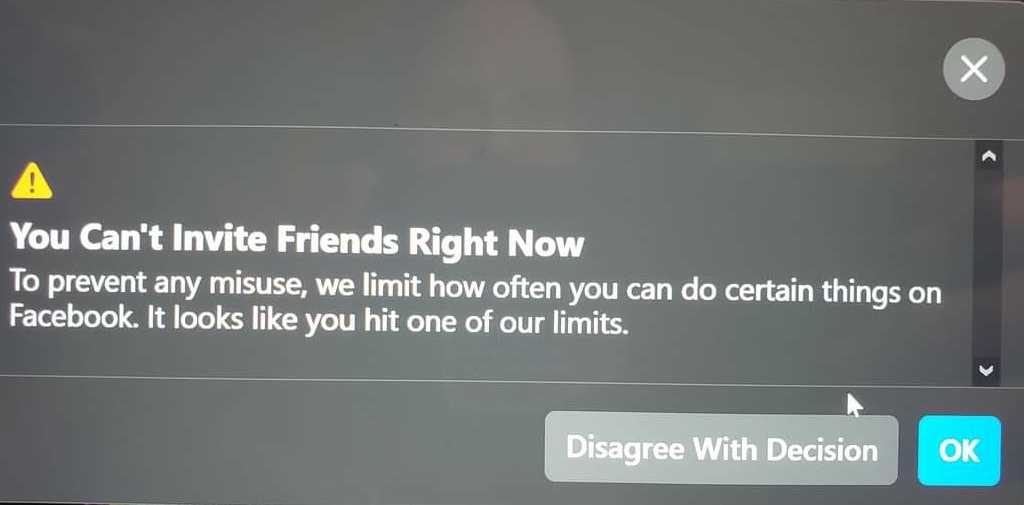
Disagreeing with the decision may mean that your access is restored straightaway, it may shorten your time in jail or it can even trigger a human review that may reverse the decision and correct an error by restoring your access or even reinstating content that may have been removed as a result of an erroneous Community Standard violation. We have had this happen to us as you can see in the screenshots below.
If that option is not available, as it often is not in cases of Hate Speech violations, you will have to appeal using this form.

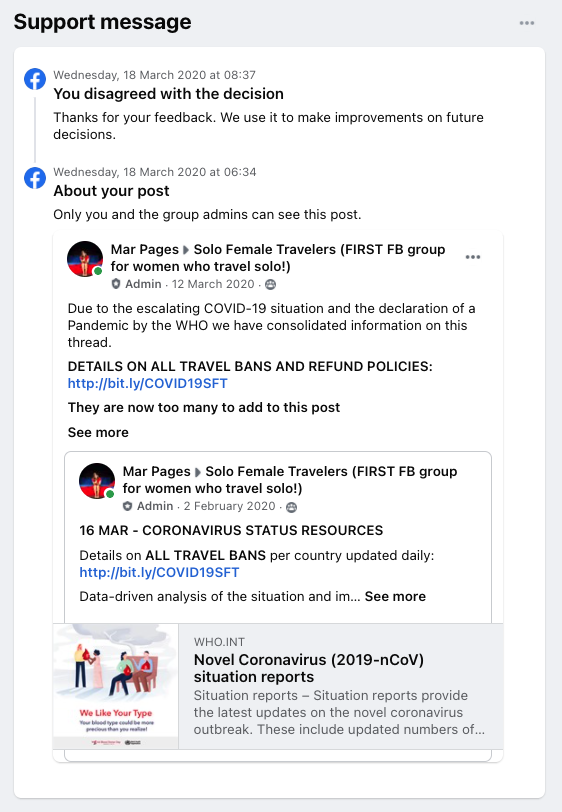
Pro tip: If you end up in jail for abusing the platform by doing too much of something too quickly in your own group, and Group Support is available to you, we know from experience that reaching out to them will be useless. As mentioned at the beginning of this article, Facebook support staff are subject to the same rules and are unable to reinstate your account, so their recommendation is the same as ours: just slow down and spread the actions among the Admin team.
Lastly, once you get out of jail, we recommend showing exemplary behavior for a while because your threshold for what is considered abusive will be lower and your time-out in jail longer if you are found to do something wrong again. From our experience, you need to show long periods of good behavior (aka no violations or abuses) for the threshold to fully reset to zero.
Learn Our Secrets to Growing 15 Groups to 100k + Members! Get Our E-Book!
400 + Actionable Pages
390 + How-to Screenshots
32 Proven Unpaid Growth Strategies
My group has exploded using your strategies. A competing group actually asked me how I was growing so quickly!!

FAQ About Facebook Jail
Facebook jail is the colloquial term used to refer to the usually temporary restrictions on usage placed on users who abuse the platform or violate its Terms of Service or Community Standards.
Anything that you do too much or too fast on Facebook can land you in jail. That includes friending too many people, liking too many pages, inviting too many people to join your group, reacting to posts or comments to fast, posting too often, sharing the same content repeatedly, sending too many direct messages, tagging too many people, joining too many groups, etc.
Spread out the actions that you do on Facebook over time and avoid sharing the same exact content (be it a post or a comment) too many times. If you are managing an active and large group, you should spread out actions among the entire Admin team to ensure not one member is excessively active.
Facebook’s Community Standards are a set of guidelines and rules that all users of the platform must follow. They ensure that the platform remains a safe space for everyone that is free of abuse and hate speech. There is a long list of banned behaviors and action that can be found here. Facebook’s Terms of Service also list behaviors and user that are banned from the platform.


Thousands of FB users, including myself, attend live auctions where you have to bid fast. I was once again put in jail for “spamming”, which of course I wasn’t. What’s the use of being able to share or comment on posts if you’re threatened with the possibility of being “jailed”? I understand preventing spamming, abusive or bullying content, stalking, etc., but surely there should be algorithms that recognize general commenting, sharing, or attending live auctions which thousands of people rely on for income. I love AI for certain things, but unnecessarily blocking people because a bot doesn’t recognize differences in commenting is going too far. Thank you for allowing my rant.